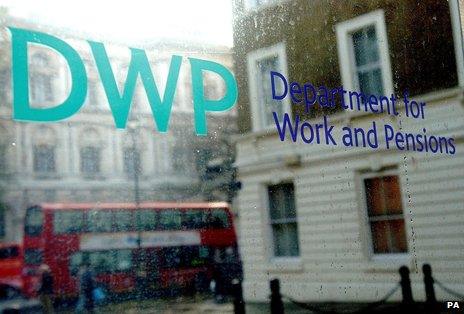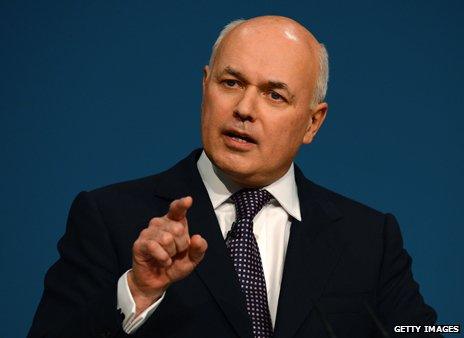Universal credit - an IT fiasco?
- Published
- comments

It's an ambitious plan to transform the benefits system - but it looks as though the technology meant to power universal credit is turning into another great government IT disaster.
This morning the work and pensions secretary Iain Duncan Smith told the BBC that the planned 2017 deadline for the programme would probably slip - although the DWP statement still talks optimistically of the continued "safe and secure roll-out" of the scheme.
One civil servant close to the situation has painted a rather different picture. He tells me that DWP staff at the frontline are doing a heroic job using the IT but they are "struggling so much with the number of times they have to re-key, systems are crashing. They're not joined up, they just can't cope with the messy reality of people's lives".
The IT system that the DWP is using at the moment is the one severely criticised in a National Audit Office report. It has been developed mainly by big outside contractors such as Accenture and IBM at a cost of more than £300m. Some believe much of that money will have to be written off.
Now what the DWP calls a new "enhanced system" is being developed, with far more in-house involvement. Insiders say this is a good move - but wonder why the department did not go down this route in the first place. After all, the government had signalled that the days of huge IT projects, where outlandish sums were handed to big contractors, were over.
But as Iain Duncan Smith makes clear in his statement, both systems - the old one run by Accenture et al, and the new enhanced version - will now run in tandem. Some of the old technology, according to my insider, may be of use, but the effect is to postpone the reckoning of just how much money has been wasted: "They're carrying on as if nothing has changed... they're still spending money trying to make the existing system work because that's what the DWP leadership wants."

Iain Duncan Smith
So, just as with many other IT disasters, this is about management rather than technology. It's been reported that the secretary of state has fallen out with his senior civil servants, with Whitehall's perceived inability to deliver on policy at the heart of their dispute.
The DWP is not alone in finding the bigger the project, the more likely it is to go wrong. Look across the Atlantic to the failures of the Obamacare website - or indeed rather closer to home at the BBC's own Digital Media Initiative, written off at a cost of £98m.
One common lesson seems to be that you can't just throw money at a project or outsource it to major suppliers. You have to have the skills in-house to understand the problems you are trying to solve and how technology may help. And, for Whitehall at least, you need more respect and higher status within the civil service for the experts who do have those skills.
My insider's conclusion: "Never again should we be spending £300m the way they spent it - as if they were buying a motorway bridge. This way of doing it is broken - it just doesn't work."